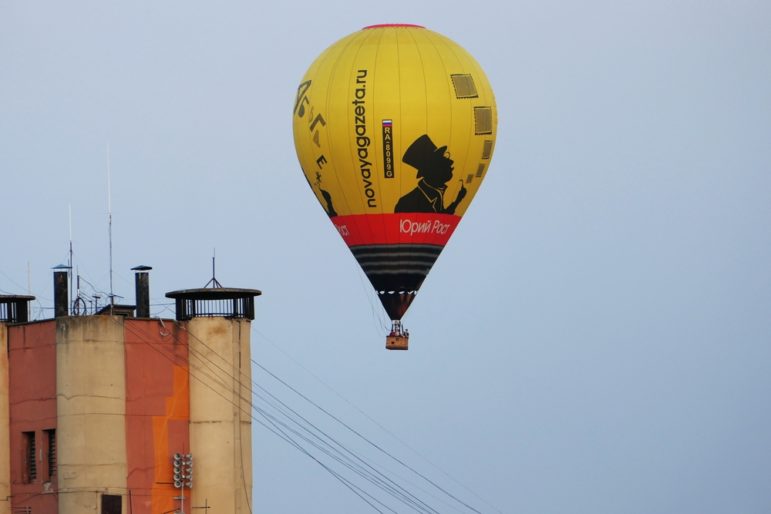
A battle for the airwaves: a hot-air balloon featuring the site of Novaya Gazeta flies over Nizhny Novgorod, Russia. Image: Shutterstock
Galina Timchenko believes that before Russian President Vladimir Putin’s military attack on Ukraine, he had already started a war with journalists — to censor and stifle critical reporting on the conflict.
Timchenko, the chief executive of the independent media outlet Meduza, called the latest round of restrictions placed on the Russian media “ruthless,” and warned of an exodus of independent reporters.
She made these comments at the webinar “Will Russia’s Independent Journalism Survive the Kremlin’s Crackdown?,” organized by the Vienna-based Presseclub Concordia, Forum for Journalism and Media, and the International Press Institute (IPI). Speaking alongside Timchenko was Kirill Martynov, deputy editor at Novaya Gazeta, a Russian newspaper known for its critical investigative stories, whose editor Dmitry Muratov was awarded the Nobel Peace Prize last year.
Independent media, along with activists, have been under assault in Russia since before the invasion. The country has often ranked among the lowest worldwide in the Press Freedom Index by Reporters Without Borders (RSF) and came in 150th out of 180 in the 2021 rankings. The latest restrictions make the situation even worse.
Russia’s ‘Foreign Agent’ Law
In December 2019, the Russian government amended a law on foreign agents, widening its definition to include anyone who received any kind of money from outside the country. A list of declared “foreign agents” was also put out by the government, and included activists critical of Putin’s government, international media organizations, and local independent news sites.
Under this new law, any so-called foreign agents would have to submit financial details to the government every six months and submit to an annual audit. The law also made it extremely difficult for organizations to receive any funds from international viewers or donors and impeded how they spent this money.
The law was largely viewed as an attempt by the Russian government to crackdown on dissent. Jeanne Cavelier, the head of RSF’s Eastern Europe and Central Asia desk, called out the law as “vague” and a threat to press freedom. “The authorities will be able to choose their targets and impose insane fines on whomever they see fit,” she said. “It will further obstruct journalists’ work and seeks to intimidate them into censoring themselves.”
On April 23, 2021, Meduza was labeled a “foreign agent” under this new amended version, which forced the organization to limit its spending. Meduza’s chief editor Ivan Kolpakov told the International Press Institute at the time: “We have lost advertisers and the business model that we have been building for six years is ruined.” While Meduza was able to power through due to a massive crowdfunding campaign among its Russian readers, other independent media organizations like Proekt and VT were forced to shut down.
Putin Doubles Down Amid Ukraine War
On March 4 — barely a week after Russia invaded Ukraine — Putin’s government introduced a new law referred to as the “fake news law” that would imprison journalists for 15 years if they used banned words like “war” or “invasion” to describe the attack on Ukraine. If they publicly called for peace they also could be charged with treason against the state. Speaking at the webinar, Timchenko said: “It’s the most crucial, the most ruthless, and the strongest attack on independent voices in Russia.”
The law sent immediate shockwaves across the country’s media landscape: Some sites removed bylines from their stories about the conflict or stopped publishing news produced by reporters in Russia. Many others simply fled the country.
“Because of this law, most of the Russian journalists were forced to leave the country,” Timchenko said. She noted the increased state censorship, with the Russian media allowed to use only government-approved phrases like “special operation” to discuss the war in Ukraine. “The whole industry is destroyed,” she said. “We are left with small islands of resistance.”

Meduza CEO Galina Timchenko discussed Russia’s “fake news” law at the IPI webinar. Image: Screenshot
Other human rights and press watchdog groups have condemned the law as well. Amnesty International said it has “unleashed an unprecedented, nationwide crackdown on independent journalism.” RSF Secretary-General Christophe Deloire said: “The Kremlin is methodically torpedoing all online media outlets that do not follow its disinformation guidelines.”
More recently, the country has taken to banning social media platforms like Instagram and Facebook. Twitter, while not completely blocked, has seen its service restricted.
Novaya Gazeta has opted for an uneasy compromise to avoid the government blocking its website. While the site doesn’t directly report on active war in Ukraine, such as casualties or the movement of troops, it continues to write about the consequences this war has on the Russian people.
Working Around the Crackdown
The attack on independent media websites and silencing of Russian journalists raises the question: Who is staying behind and how will their reporting reach its main audience — the people of Russia?
Meduza was founded in 2014, when Timchenko, who had been forced to resign as editor-in-chief of Lenta.ru, decamped along with many of her former colleagues for Riga, Latvia. Here they were able to set up Meduza and continue to cover Russia’s ongoing proxy war in the Donbas and its annexation of Crimea without fear of the Russian government. So when their website was blocked inside Russia on March 3 of this year, her team was ready.
“We have plans and are well prepared,” said Timchenko of how the site will work around the online ban. As the threat of war loomed larger over the past few months, and in anticipation of some kind of further crackdown, Meduza had also started a campaign encouraging their readers to download virtual private networks (VPNs), so that they would be able to access its reporting in the event of an internet ban. “We will not surrender,” she added.
But it won’t be easy. Before being blocked, Meduza’s website had two million unique users every day. Since March 3, they’ve experienced a notable decline, but continue to reach 500,000 unique visitors daily. “We now like to broadcast from all possible platforms: email newsletters — three of them, messengers, social media, applications, podcasts, YouTube, and so on,” said Timchenko.
Email newsletters offer independent media in Russia one notable advantage. They do not fall under the legal definition of “spreading information” because they are a one-to-one communication, where the recipient has to opt-in to receive it. Outside of newsletters, Timchenko said that Meduza’s Telegram channel has one million users, while nearly the same amount use their mobile application.
Novaya Gazeta still uses more traditional distribution methods like newsstands and kiosks, and standard postal mail delivery. However, it reaches the majority of its readers through the website. Novaya Gazeta’s Martynov sees YouTube as the last, best hope for independent media in Russia, since the platform still draws about 45 million daily users. It’s “the only way for international media” to reach large audiences inside the country, he said. “We still have public interest and a record number of visitors on our website, even though we can’t write about war.”

At the IPI webinar, Novaya Gazeta Deputy Editor Kiril Martnov said YouTube is the “last channel” for reaching large audiences in Russia. Image: Screenshot
With Russian media outlets and internationally-recognized social media apps hit by the state censorship law, many outlets have turned to the encrypted Russian messenger network Telegram. Timchenko said that it was one of the “fastest and safest ways to broadcast information,” and likened Telegram to a “fire exit” for independent media in Russia — a way of putting out information while evading censors. Martynov likewise called it a “miracle” that Telegram was still allowed to function and agreed that news sites should utilize it to reach readers.
More good news: Both organizations say website traffic figures demonstrate a strong, continued desire for independent voices in the Russian media landscape. Timchenko also noted that Meduza’s audience was mostly comprised of the younger generations of news consumers.
A Lack of On-the-Ground Reporters
Even though Meduza has long been based in Latvia to avoid government suppression, its award-winning investigative reporter, Alexey Kovalev, remained in Moscow so he could report from inside Russia. However, he was forced to leave not long after the invasion of Ukraine and crossed the border on foot. Many others like him have also had to, almost overnight, pack up their lives go into exile. One early report estimated that as many as 150 reporters had left Russia in the days after the war began.
This has created another challenge: finding reporters who can still reliably and safely work inside Russia. The government not only targets independent media organizations but also individual journalists who have worked with them in the past. Timchenko said Moscow has also started preparing blacklists of journalists working with organizations banned under the recent “fake news” law. This effectively means that any journalist who has worked for an organization like Meduza at any time in the past can be targeted and imprisoned by the Russian government.
Both speakers concluded that the Russian military’s devastating attacks on Ukraine painted a grim picture for Russia’s own citizens — and its press. “If you attack Ukraine you are not concerned with such small problems like lawmaking,” said Martynov. He said that while covering war, there are often safe spaces for journalists, away from the frontlines. But in Russia right now, he said, reporters have no place to hide.
Watch the full webinar below:
Additional Resources
How Reporters Built a Crowdfunding Campaign in Four Days to Save Meduza
Nobel Winner Muratov: Be an Investigative Reporter, and Fight for a Better World
Bellingcat’s Grozev on Investigating Russia’s Invasion of Ukraine
 Amel Ghani, GIJN’s Urdu Editor, has reported on various issues, from the rise of religious political parties in Pakistan to the environment and digital rights. She is a Fulbright Fellow and holds a Master’s degree in journalism from Columbia University, where she specialized in investigative journalism.
Amel Ghani, GIJN’s Urdu Editor, has reported on various issues, from the rise of religious political parties in Pakistan to the environment and digital rights. She is a Fulbright Fellow and holds a Master’s degree in journalism from Columbia University, where she specialized in investigative journalism.
